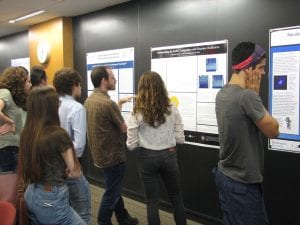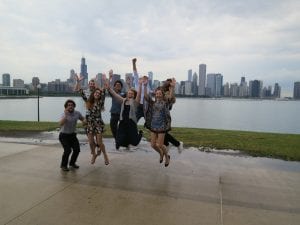In addition to the research seminars provided by Faculty Mentors and other STEM researchers on the Northwestern campus, we organize a series of hands-on technical skills workshops and professional development activities. Materials for our professional development series can be found on our GitHub site.
Science Communication Skills
It is increasingly important to convey research results clearly and concisely to a broad variety of audiences, from expert to general. With this in mind, CIERA founded the Ready, Set, Go program, now known as the Research Communication Training Program (RCTP). RCTP coaches students on building confidence in all communication roles, enhancing the clarity of their message, and forming a connection with their audience. We provide three communication workshop sessions for our REU students, strengthening their science communication skills, and focusing on oral presentations and poster design. We also work with Northwestern’s writing place, to help students through the article drafting process. This includes workshops on research paper structure; science writing best practices; peer-editing skills; and a LaTeX primer. At the end of the summer, students will leave with a structured working research paper draft which can be finished and submitted afterwards. Finally, members of our Northwestern IT data visualization group provide a seminar of best-practices in generating research figures for papers, posters and the web.
Computational Skills Development
Prior to arriving at Northwestern, we require any student who is new to Python to complete the REACHpy Python course. This way, all students arrive with at least the same basic background. Once on campus, we provide a series of workshops in computer programming skills – essential for any STEM career – focusing on Python, as well as a workshop on website design (to aid the students in designing their research website). These workshops are developed and led by CIERA members. Additionally, Northwestern IT provides all of our REU students with accounts on Quest, NU’s high-performance computer cluster (HPC), and runs a hands-on tutorial on using Quest (and HPCs in general), covering remote logins, submitting jobs, moving data to and from Quest, etc.
Preparation for Graduate School
Each summer we organize a panel discussion about graduate school and GRE preparation. The panel includes graduate students from Northwestern in astronomy, physics and other STEM disciplines. The discussions are candid, lively, and open. As part of the discussion, we provide information about the GRE exam, how the results are used and viewed in astronomy, tips about how to study, links to study materials, and we encourage the students to study together for the GRE during the summer (e.g., by taking a practice Physics GRE exam together).
Career Panel Discussion
Each summer, we also organizes a career panel discussion, highlighting the range of careers available to astronomers. We have new panel members every year, all with Ph.D.s in astronomy or physics who became, e.g., financial analysts, software designers, science writers, government administrators, biotech researchers, astronomy faculty, and more. We use Google Hangouts and live-stream and archive the discussion on YouTube. We also invite other REU programs and students outside of NU to join remotely. Panelists share their career paths, the skills they developed through their Ph.D.s that are applicable to their current jobs, and highlight their work-life balance. The students participate in a Q&A session with the panelists. See below for links to our past discussions:
2023 Panel Discussion
2022 Panel Discussion
2021 Panel Discussion
2020 Panel Discussion
2019 Panel Discussion
2018 Panel Discussion
2017 Panel Discussion
2016 Panel Discussion
2015 Panel Discussion
Presenting REU Research Results
In the final week, the REU students present their research results in two poster sessions, each for a different audience. One poster session is at Northwestern for STEM faculty, students and other professionals. A second poster presentation is for friend and family and the “general public”. In the past, we’ve held this second poster session either in person at the Adler Planetarium in Chicago, or virtually on Zoom. In either location, this is a chance for students to share their research with the broader community. These presentations are a culminating experience in the RCTP training in thoughtfully addressing different audiences. Students also produce research websites, hosted here. We anticipate that some students and mentors will finalize their research papers and submit them to refereed journals during the academic year (though this is not required). Most students also present their posters at the subsequent American Astronomical Society (AAS) meeting.
Field Trips
We are not completely focused on work here! The social aspect to our REU program is strong, and something that we are very proud of. The friendship and camaraderie within the REU cohort enriches the students’ summers immeasurably. To help build these bonds, we organize field trips. In previous years we have traveled to Fermilab, Yerkes Observatory and the Adler Planetarium. We strongly encourage inclusiveness in social interactions among the group.
A Final Note
This may sound like a lot of activities. It is! And it is also very fun and rewarding. We carefully pace our students throughout the summer to ensure that the workshops and final products can be completed without negatively impacting research productivity. Always, the research experience is given priority; we will adjust the other deadlines and expectations on a per-student basis, if necessary. The same content is often used within the poster, website and paper (though usually presented and organized in different ways). Students who succeed in these final products are offered funding to attend and present their posters at the American Astronomical Society (AAS) meeting during the following winter. Our prior REUs have been very successful in meeting these expectations, and nearly all have accepted our offer to travel to the AAS meeting.











